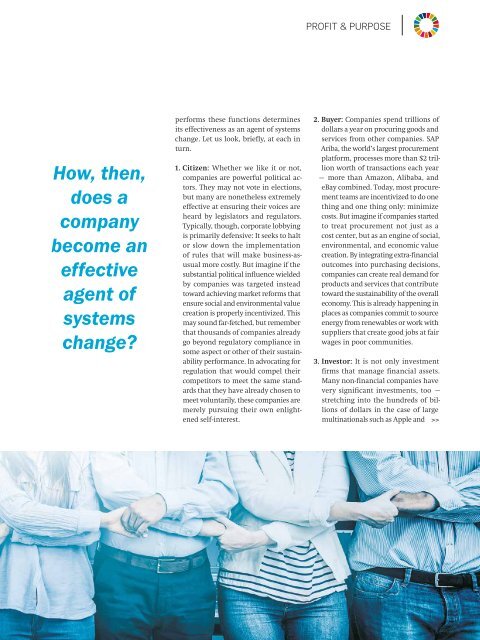Aliging Profit with Purpose - Global Goals Yearbook 2019
What are companies for? The rules for companies have changed. The focus is increasingly on their sustainable, social, and ecological impacts. The strategic orientation toward the so-called corporate purpose is decisive for profitable growth in the future. This currently results in a large number of questions for businesses: How do you find an inspiring and future-oriented corporate purpose, and how can it be aligned in such a way that it brings profitable growth and social responsibility in concert? The new 2019 edition of the Global Goals Yearbook offers answers to these crucial questions thanks to its consistent orientation toward the UN Sustainable Development Goals and a competent editorial board and author pool.
What are companies for? The rules for companies have changed. The focus is increasingly on their sustainable, social, and ecological impacts. The strategic orientation toward the so-called corporate purpose is decisive for profitable growth in the future.
This currently results in a large number of questions for businesses: How do you find an inspiring and future-oriented corporate purpose, and how can it be aligned in such a way that it brings profitable growth and social responsibility in concert? The new 2019 edition of the Global Goals Yearbook offers answers to these crucial questions thanks to its consistent orientation toward the UN Sustainable Development Goals and a competent editorial board and author pool.
You also want an ePaper? Increase the reach of your titles
YUMPU automatically turns print PDFs into web optimized ePapers that Google loves.
PROFIT & PURPOSE<br />
How, then,<br />
does a<br />
company<br />
become an<br />
effective<br />
agent of<br />
systems<br />
change?<br />
performs these functions determines<br />
its effectiveness as an agent of systems<br />
change. Let us look, briefly, at each in<br />
turn.<br />
1. Citizen: Whether we like it or not,<br />
companies are powerful political actors.<br />
They may not vote in elections,<br />
but many are nonetheless extremely<br />
effective at ensuring their voices are<br />
heard by legislators and regulators.<br />
Typically, though, corporate lobbying<br />
is primarily defensive: It seeks to halt<br />
or slow down the implementation<br />
of rules that will make business-asusual<br />
more costly. But imagine if the<br />
substantial political influence wielded<br />
by companies was targeted instead<br />
toward achieving market reforms that<br />
ensure social and environmental value<br />
creation is properly incentivized. This<br />
may sound far-fetched, but remember<br />
that thousands of companies already<br />
go beyond regulatory compliance in<br />
some aspect or other of their sustainability<br />
performance. In advocating for<br />
regulation that would compel their<br />
competitors to meet the same standards<br />
that they have already chosen to<br />
meet voluntarily, these companies are<br />
merely pursuing their own enlightened<br />
self-interest.<br />
2. Buyer: Companies spend trillions of<br />
dollars a year on procuring goods and<br />
services from other companies. SAP<br />
Ariba, the world’s largest procurement<br />
platform, processes more than $2 trillion<br />
worth of transactions each year<br />
– more than Amazon, Alibaba, and<br />
eBay combined. Today, most procurement<br />
teams are incentivized to do one<br />
thing and one thing only: minimize<br />
costs. But imagine if companies started<br />
to treat procurement not just as a<br />
cost center, but as an engine of social,<br />
environmental, and economic value<br />
creation. By integrating extra-financial<br />
outcomes into purchasing decisions,<br />
companies can create real demand for<br />
products and services that contribute<br />
toward the sustainability of the overall<br />
economy. This is already happening in<br />
places as companies commit to source<br />
energy from renewables or work <strong>with</strong><br />
suppliers that create good jobs at fair<br />
wages in poor communities.<br />
3. Investor: It is not only investment<br />
firms that manage financial assets.<br />
Many non-financial companies have<br />
very significant investments, too –<br />
stretching into the hundreds of billions<br />
of dollars in the case of large<br />
multinationals such as Apple and >><br />
<strong>Global</strong> <strong>Goals</strong> <strong>Yearbook</strong> <strong>2019</strong><br />
15

















